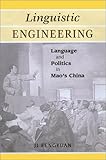Linguistic Engineering : Language and Politics in Mao's China / Ji Fengyuan.
Material type: TextPublisher: Honolulu : University of Hawaii Press, [2003]Copyright date: ©2003Description: 1 online resource (360 p.)Content type:
TextPublisher: Honolulu : University of Hawaii Press, [2003]Copyright date: ©2003Description: 1 online resource (360 p.)Content type: - 9780824825362
- 9780824844684
- online - DeGruyter
- Issued also in print.
| Item type | Current library | Call number | URL | Status | Notes | Barcode | |
|---|---|---|---|---|---|---|---|
 eBook
eBook
|
Biblioteca "Angelicum" Pont. Univ. S.Tommaso d'Aquino Nuvola online | online - DeGruyter (Browse shelf(Opens below)) | Online access | Not for loan (Accesso limitato) | Accesso per gli utenti autorizzati / Access for authorized users | (dgr)9780824844684 |
Browsing Biblioteca "Angelicum" Pont. Univ. S.Tommaso d'Aquino shelves, Shelving location: Nuvola online Close shelf browser (Hides shelf browser)

|

|

|

|

|

|

|
||
| online - DeGruyter Fieldwork and Families : Constructing New Models for Ethnographic Research / | online - DeGruyter On the Edge of the Banda Zone : Past and Present in the Social Organization of a Moluccan Trading Network / | online - DeGruyter Japanese Loyalism Reconstrued : Yamagata Daini's Ryūshi shinron of 1759 / | online - DeGruyter Linguistic Engineering : Language and Politics in Mao's China / | online - DeGruyter Globalization and Cultural Trends in China / | online - DeGruyter The Dreams of Two Yi-min / | online - DeGruyter Kabuki Plays On Stage. Volume 3 : Darkness and Desire, 1804-1864 / |
Frontmatter -- Contents -- Acknowledgments -- Introduction -- I. Prelude -- 1. Linguistic Engineering: Theoretical Considerations -- 2. Linguistic Engineering before the Cultural Revolution -- II. Mass Mobilization, Language, and Interpretation, 1966-1968 -- 3. Mao's Revolutionary Strategy, 1966-1968: Contexts, Interpretive Principles, and Capitalist Roaders -- 4. Revolutionary Conformity, Public Criticism, and Formulae -- 5. Dichotomies, Demons, and Violence -- III. Institutionalizing the Cultural Revolution, 1968-1976 -- 6. Creating Referents and Controlling the Word -- 7. Controlling Culture: Literature and Dramatic Art -- 8. Educating Revolutionaries: The Case of English Language Teaching -- IV. Assessment -- 9. China's Great Experiment: Intensity, Success, and Failure -- Notes -- Bibliography -- Index
restricted access online access with authorization star
http://purl.org/coar/access_right/c_16ec
When Mao and the Chinese Communist Party won power in 1949, they were determined to create new, revolutionary human beings. Their most precise instrument of ideological transformation was a massive program of linguistic engineering. They taught everyone a new political vocabulary, gave old words new meanings, converted traditional terms to revolutionary purposes, suppressed words that expressed "incorrect" thought, and required the whole population to recite slogans, stock phrases, and scripts that gave "correct" linguistic form to "correct" thought. They assumed that constant repetition would cause the revolutionary formulae to penetrate people's minds, engendering revolutionary beliefs and values. In an introductory chapter, Dr. Ji assesses the potential of linguistic engineering by examining research on the relationship between language and thought. In subsequent chapters, she traces the origins of linguistic engineering in China, describes its development during the early years of communist rule, then explores in detail the unprecedented manipulation of language during the Cultural Revolution of 1966-1976. Along the way, she analyzes the forms of linguistic engineering associated with land reform, class struggle, personal relationships, the Great Leap Forward, Mao-worship, Red Guard activism, revolutionary violence, Public Criticism Meetings, the model revolutionary operas, and foreign language teaching. She also reinterprets Mao's strategy during the early stages of the Cultural Revolution, showing how he manipulated exegetical principles and contexts of judgment to "frame" his alleged opponents. The work concludes with an assessment of the successes and failures of linguistic engineering and an account of how the Chinese Communist Party relaxed its control of language after Mao's death.
Issued also in print.
Mode of access: Internet via World Wide Web.
In English.
Description based on online resource; title from PDF title page (publisher's Web site, viewed 02. Mrz 2022)


